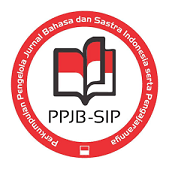PENERAPAN MODEL PEMBELAJARAN BERBASIS MASALAH (PROBLEM BASED LEARNING) DALAM PEMBELAJARAN MENULIS TEKS ANEKDOT
DOI:
https://doi.org/10.23887/jjpbs.v3i1.4773Abstrak
Penelitian ini merupakan penelitian deskriptif kualitatif yang bertujuan (1) mendeskripsikan perencanaan model pembelajaran berbasis masalah dalam pembelajaran menulis teks anekdot siswa kelas X SMA Negeri 3 Singaraja;(2) mendeskripsikan penerapan model pembelajaran berbasis masalah dalam pembelajaran menulis teks anekdot siswa kelas X SMA Negeri 3 Singaraja;(3) mendeskripsikan hambatan yang ditemui guru dalam menerapkan model pembelajaran berbasis masalah dalam pembelajaran menulis teks anekdot siswa kelas X SMA Negeri 3 Singaraja. Subjek dalam penelitian ini adalah guru dan siswa kelas X SMA Negeri 3 Singaraja. Metode yang digunakan untuk mengumpulkan data dalam penelitian ini adalah metode dokumentasi, observasi dan metode wawancara. Metode dokumentasi digunakan untuk mengumpulkan data mengenai perencanaan dan penerapan model pembelajaran berbasis masalah. Metode observasi digunakan untuk memperoleh data mengenai penerapan model pembelajaran berbasis masalah dan metode wawancara untuk mendapatkan data mengenai hambatan yang ditemui guru dalam menerapkan model pembelajaran berbasis masalah. Data yang telah terkumpul dianalisis dengan metode deskriptif. Hasil penelitian ini adalah (1) perencanaan model pembelajaran berbasis masalah yang dibuat oleh guru berupa RPP telah sesuai dengan komponen kurikulum 2013;(2) penerapan model pembelajaran berbasis masalah yang dilakukan guru telah sesuai dengan sintaks model pembelajaran berbasis masalah;(3) hambatan yang dihadapi atau ditemui guru dalam menerapkan model pembelajaran berbasis masalah dalam pembelajaran menulis teks anekdot adalah dari aspek guru dan peserta didik.Kata Kunci : model pembelajaran berbasis masalah, anekdot
This descriptive qualitative research was aimed at (1) describing the plan of problem-based learning method for grade X students of SMA Negeri 3 Singaraja in writing anecdote text; (2) describing the application of problem-based learning method for grade X students of SMA Negeri 3 Singaraja in writing anecdote text; (3) describing the obstacles faced by the teacher while applying problem-based learning method for grade X students of SMA Negeri 3 Singaraja in writing anecdote text. The subject of this research was the teacher and the grade X students of SMA Negeri 3 Singaraja. The data was collected through documentation, observation and interview. The documentation method was conducted to collect the data of the plan and application of problem-based learning method. The observation method was conducted to collect the data of the application of problem-based learning method. The interview method was conducted to collect the data of the obstacles faced by the teacher while applying problem-based learning method. Those data was analyzed through descriptive method. The result of the research were (1) the plan of problem-based learning method which was made by the teacher was lesson plan; (2) describing the application of problem-based learning method which was conducted by the teacher had already appropriate with the syntax of problem-based learning method; (3) the obstacles faced by the teacher while applying problem-based learning method came from teacher and students aspects.
keyword : problem-based learning model, anecdotes
Diterbitkan
2015-03-06
Terbitan
Bagian
Articles
Lisensi
Authors who publish with the Jurnal Pendidikan Bahasa dan Sastra Indonesia Undiksha agree to the following terms:- Authors retain copyright and grant the journal the right of first publication with the work simultaneously licensed under a Creative Commons Attribution License (CC BY-SA 4.0) that allows others to share the work with an acknowledgment of the work's authorship and initial publication in this journal
- Authors are able to enter into separate, additional contractual arrangements for the non-exclusive distribution of the journal's published version of the work (e.g., post it to an institutional repository or publish it in a book), with an acknowledgment of its initial publication in this journal.
- Authors are permitted and encouraged to post their work online (e.g., in institutional repositories or on their website) prior to and during the submission process, as it can lead to productive exchanges, as well as earlier and greater citation of published work. (See The Effect of Open Access)







